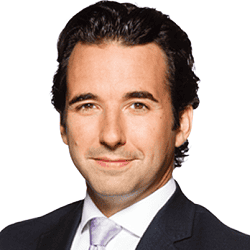
David Azerrad
2007 Publius Fellow
What is your current position?
I work at The Heritage Foundation where I am the Director of the B. Kenneth Simon Center for Principles and Politics, as well as the AWC Family Foundation Fellow. My colleagues and I in the Simon Center study the ideas, events, people and institutions that have shaped America, for better or for worse, from the Founding until today, with a particular emphasis on confronting the central threats now confronting the regime. I also teach classes on American conservative and liberal political thought at American University.
What inspired you to choose this career path?
I went to grad school at the University of Dallas to study political philosophy and American political thought, but I never wanted to go into the academy for all the obvious reasons. I also wanted to have one foot in the world of ideas, and one foot in the world of politics. Think-tanking in Washington seemed to be—and has proven to be—the best way to do that. I get to read, think, write and teach, while also fighting the good fight.
What are you currently working on?
I recently published a long essay on “The Promises and Perils of Identity Politics” in which I retraced the intellectual origins of identity politics in America to various movements from the 1960s and 1970s (in particular the Black Power and women’s liberation movements). I would now like to write a critique of identity politics which focuses on its internal contradictions. Eventually, I would like to write a book on the subject.
Why the focus on identity politics?
I think that the radicalization and spread of identity politics is one of the central threats confronting the country today. Identity politics is a fundamentally illiberal ideology that fosters resentment and alienation, pits us against one another, and dissolves the strong civic ties that should bind us. To put it bluntly: you can’t have a country with identity politics.
The main reason identity politics exerts such powerful pull in America is because it claims to speak, exclusively one should note, on behalf of those who have undeniably been mistreated (to varying degrees) in the past. It appeals to our sense of justice. It suggests that we can either embrace identity politics or remain callously indifferent to the well-being of fellow citizens who don’t look like us.
That, in truth, is a false choice. One can sympathize and feel solidarity with those who are pressing just claims without embracing the poisonous ideology of identity politics. Identity politics should be rejected not because it demands justice for those who have been unjustly treated, but because it poses a threat to republican self-government by corroding patriotic ties, fostering hatred, promoting cultural separatism, and demanding special treatment rather than equality under the law.
How did you hear about the Claremont Institute?
Tom West, who at the time was one of my professors at the University of Dallas, recommended I apply for a Publius fellowship. I got turned down, I later found out, because of my questionable Canadian background! A few years later, when my attachment to my adoptive country was no longer in doubt, I reapplied and got accepted. And this year, I should add, I will be teaching in the Publius Fellowship for the first time!
What’s your fondest memory of the Claremont Institute?
The friends I made and watching The Man Who Shot Liberty Valence with John Marini. I had never seen it and it’s since become one of my favorite movies—in no small part thanks to John’s analysis of it. John did not, however, succeed in making me a devotee of The Searchers (although the fault surely lies with me since I would not have the temerity to question his judgment in such matters).
There are all sorts of educational programs out there for current and rising conservative professionals. What do you think makes the Claremont Institute’s Fellowships unique?
Kesler, Voegeli, Marini, West, Erler, Uhlmann and all the others. The caliber of the scholars is very impressive. These are people you can learn from and who are eager to teach.
If you could have a drink with an American Founder, or any great thinker, who would it be, why, and what would you order?
Beers with Franklin. I think he had the most capacious mind of that Founding generation. Hamilton remains my favorite Founder, but I think Franklin would be a better drinking companion.
Who was more important for their time, George Washington or Abraham Lincoln? Why?
I’m not sure it’s possible to answer that one. No Washington, no America. No Lincoln, no America—or rather, a truncated America. They were both indispensable.
What books are you reading right now?
I’ve just started reading Albion’s Seed by David Hackett Fischer to better understand what Tom West calls, in The Political Theory of the American Founding, “the matter” of the founding. We students of political theory focus almost exclusively on the form of the founding, that is, the natural rights philosophy of the Declaration of Independence and the republican structure of government in the Constitution. West reminds us that even though the form takes precedence over the matter which is “honed and shaped by it,” the matter is a constitutive component of the regime.
What is your favorite cultural/recreational pastime (or hobby) and why?
Anything that doesn’t involve a computer, my iPhone, a television or any other type of screen.

